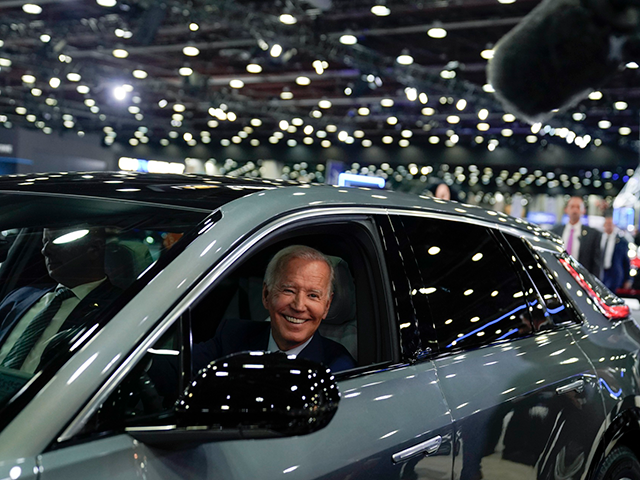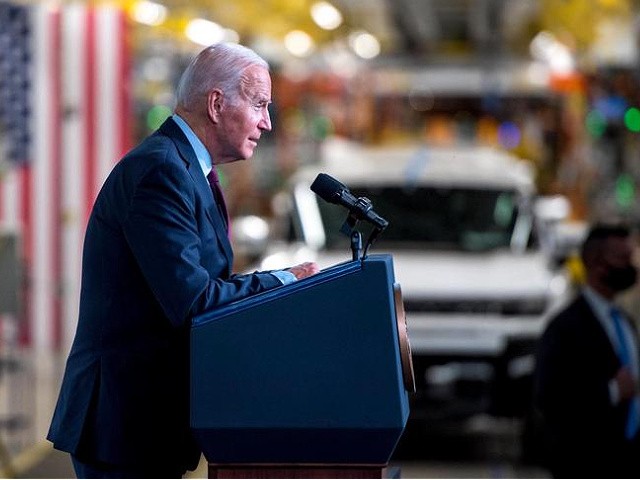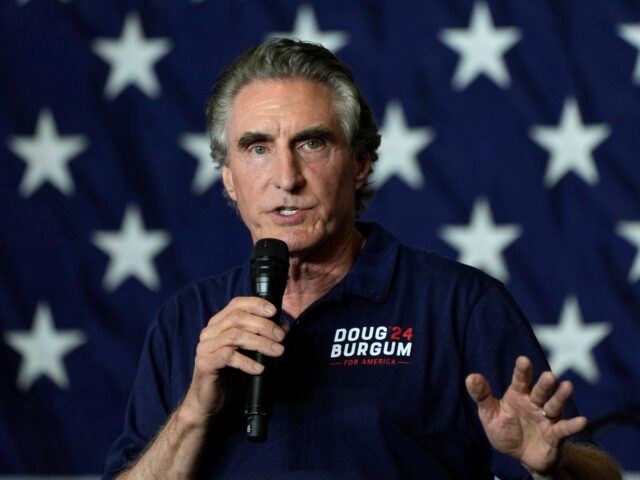OKLAHOMA CITY, Oklahoma — North Dakota Gov. Doug Burgum, a 2024 GOP presidential candidate, told Breitbart News here on Monday afternoon that Democrat President Joe Biden’s push to move America to electric vehicles is failing because the United States is nowhere near ready for it.
Burgum’s interview with Breitbart News came at the inaugural American Energy Security Summit hosted at the Hamm Institute for American Energy at Oklahoma State University. Burgum will appear on the debate stage on Tuesday night in Southern California for the second GOP presidential debate at the Ronald Reagan Presidential Library in Simi Valley. The debate begins at 9 p.m. ET on Wednesday evening and is hosted on Fox Business Channel.
Burgum’s interview also came hours before Biden visited striking United Auto Workers (UAW) union members in Michigan on Tuesday—former President Donald Trump, the GOP’s 2024 frontrunner, will appear with auto workers in Michigan on Wednesday in lieu of going to the debate—which Burgum noted is a strike all about the White House favoring electric vehicles. Biden, for his part, did not even address the electric vehicle issue during his quick 12-minute appearance on the picket line on Tuesday.

President Joe Biden drives a Cadillac Lyriq through the showroom during a tour at the Detroit Auto Show, Sept. 14, 2022, in Detroit. (AP Photo/Evan Vucci, File)
“No, we’re not anywhere close to being prepared,” Burgum told Breitbart News when asked if the U.S. is ready or the transition the Biden administration is gunning for. “The UAW strike is really about the fact that the White House said we’re going to subsidize a certain kind of vehicle—an electric-powered vehicle—but when they’re doing that they’re not saying we need one third of the work. This isn’t about wages. This is about wiping out the auto industry in the west because if you’re not building an internal combustion machine you don’t need the suppliers, you don’t need all these other components, you don’t need that—you just need a battery. But then what are you going to have? Some of these new vehicles coming out are going to weigh twice as much as the vehicles did before and if you’ve got—put that kind of mass on the road rolling at that kind of speed, what that could mean in auto deaths is another factor that no one’s talking about much less the battery disposal. If you’re going to have a 900-pound vehicle for a large vehicle versus what used to be, like a Suburban or Expedition might be half of that, what does that do to our roads? Then, where is the power coming from? They’re going to have 500,000 EV charging stations but you can’t get a power line permitted in this country? Then we’ve got to have three to five times as much transmission, okay, to actually get the power to where the cars are so the transmission would have to go into the most densely populated parts of the country like the northeast or like Los Angeles. We can’t barely get a power line built out in the middle of nowhere in the prairie much less get one built in a dense urban area.”
Burgum added that the amount of power and the power infrastructure in the United States is decades away from being at a place where it could handle the level of electric vehicle adoption Biden is promoting. Of course, in recent weeks not one but two different members of the president’s cabinet—Secretary of Energy Jennifer Granholm and Secretary of Transportation Pete Buttigieg—have been found to have had major issues even finding parking spaces to charge their electric vehicles while on official U.S. government business.
If the senior most members of the federal government cannot easily handle this stuff, it is unclear how the government expects any ordinary American to do so.
“So we need three to five times the amount of transmission and then someone needs to create the base load power and this administration is attacking base load power and shutting down the base load power for intermittence,” Burgum said. “So again nothing about the plan makes any sense. Not from a U.S. competitiveness, not from a labor standpoint, and it actually doesn’t from an environmental standpoint, it doesn’t from physics or it doesn’t make sense economically. And it doesn’t make common sense because the pieces are not in place. We don’t have the power to drive the cars. We don’t have the transmission to get it to where the cars are. And then we’re building heavier cars to go on the road in weight which is one of the things that deteriorates roads. None of it makes any sense. Well, if you said ‘oh we’ll do all of that and somehow make the world cleaner’ but the cost to get rid of a ton of CO2 that way through all these subsidies would be over a thousand dollars. You can take, for fifty bucks, and you can get rid of CO2 from liquid fuels. So if you wanted to do it in order of magnitude better, cheaper, and safer, you’d let the actual industry that produces energy today—you’d let them innovate. It’s innovation not regulation that’s going to solve an emissions problem. So, like I said, it’s 180 degrees in the wrong direction.”
Burgum said the Biden administration’s energy policies writ large seem to be designed to “attack” the energy producers in this nation so much so that he argues China and OPEC could have written the Biden policy themselves.

U.S. President Joe Biden speaks at the General Motors Factory ZERO electric vehicle assembly plant on November 17, 2021 in Detroit, Michigan. (Nic Antaya/Getty Images)
“There’s an active effort across virtually every agency in the federal government driven by Biden himself to say there’s an attack on U.S. energy,” Burgum said. “It’s not just fossil fuels. It’s an attack on liquid fuels really of all sorts and there’s really ‘we’re going to try to drive them out of business’ and ‘we’re going to try to move the whole world to EVs.’ I couldn’t think of anything that is more harmful to the U.S. economy, to national security, and to global stability than the United States pursuing that policy. I’ve been saying it’s like trading OPEC for SINOPEC but actually if you kill the U.S. liquid fuels industry you’re actually helping OPEC too. It’s kind of like—who designed the Biden energy policy? Well, it was China—but maybe it was China and OPEC together who designed because ‘we’ll just eliminate our supply on the market by shutting it down prematurely in some idea that we’re going to save the world.’ But, unlike everybody else, we’re the one nation actually lowering emissions through our clean energy policies and everybody else like China—the world’s largest producer—we’re going to have them build our batteries? It just doesn’t make any sense at any level.”
The first GOP presidential debate, which Fox News hosted and was moderated by Bret Baier and Martha MacCallum, was disastrous by most accounts in that major issues like energy security and more were totally ignored. Burgum told Breitbart News that he hopes this next debate has a huge focus on energy security—and that he considers it a centerpiece of his campaign message as he crisscrosses the nation in his White House bid.
“Economy, energy, national security—we talk about it at every stop,” Burgum said. “We’ll keep trying to punch through and keep talking about it because these are the things that matter. The existential crisis for our country is our Cold War with China. It’s not climate. Climate policy might be an existential crisis because the Biden climate policy is the thing that’s actually helping China—it’s the thing that’s driving this up. China is opening up—they’re already the world’s largest polluter. Now they’re opening up a coal plant every week. So, it doesn’t matter if it’s a solar panel or a battery, if it’s made in China it’s being built in a coal-powered factory. The Washington Post last week had an article talking about how China is so amazing and they’ve got a higher penetration of new EV sales, aren’t they wonderful? They never mention in that article the source of that power. Every one of those EVs in China is being powered by coal. That’s where it’s coming from. Why are they celebrating that if they’re trying to reduce emissions? But China is also going to keep building power plants because they’ve got people in their country that don’t have electricity yet. They’re not going to stop. They’re going to be increasing their CO2 emissions at least for another decade until the mid-2030s.”
Burgum also said the United States has no place in telling people without electricity worldwide that they cannot have power.
“Who are we to say that a billion people or whatever it is worldwide who don’t have electricity should not have electricity?” Burgum said. “If they get electricity, it might actually be less emissions with centralized coal power than what they’re doing right now burning wood.”
Despite all of this evidence that the Biden push towards electric vehicle adoption has been an abject failure—and that the administration’s “attack” on traditional energy producers is harming the country economically and from a security standpoint—Burgum says he thinks the administration continues to pursue these damaging and nonsensical policies for a purely political motive. He said that Biden has proven the notion that he is a “moderate” to be wrong, and that he and his administration are “extremist” in nature.
“The narrative was when Joe Biden got elected was that he was the moderate. But everything he’s done from a policy standpoint has been extreme—radical environmentalist extremist or however you want to describe it, it’s been far left,” Burgum said when asked why the Biden administration keeps pursuing this green agenda even though it’s a proven failure. “The only answer to your question is it’s all political. I mean, because there’s not any data and there’s not any math that would support this as an approach. It doesn’t make any sense for America. It makes a lot of sense for our adversaries. But it doesn’t make sense for our country or for the world. If you really cared about the environment, you’d want to have all the energy produced here because when it’s produced in America it’s produced cleaner, safer, and more smartly with less carbon emissions than anywhere else—than anywhere else. But this is the administration that’s gone to OPEC, they’ve gone to Venezuela—when we needed more energy to get the price down before the midterms, they drained the Strategic Petroleum Reserve in half and went to our adversaries and asked them to help increase the supply. They did not come to Texas, Oklahoma, North Dakota, Montana, Wyoming, or Alaska—our six largest energy-producing states—they didn’t call any of those governors and say ‘hey could you guys dial it up?’ No. So, part of what we do on day one is sell energy to our allies and stop buying it from our adversaries. That’s the one thing—when I’m your president, that’s what I’ll be doing.”
The answer to the question of how to actually reduce emissions, Burgum said, is not through government regulation—it is through pursuing technologies that improve the production process for energy and reduce emissions while increasing output.
“Innovation over regulation. It was a theme of my talk today, it’s a theme we have in North Dakota,” Burgum said. “The idea that the Biden administration is somehow going to regulate us to a better future will never work. All that does is choke our one advantage in a democracy that’s got free markets. Innovation is what’s going to solve all these issues. It is solving the emissions issue—it’s why America has the largest CO2 decreases of anyone else. It’s not because of regulation. It’s because of innovation.”

COMMENTS
Please let us know if you're having issues with commenting.